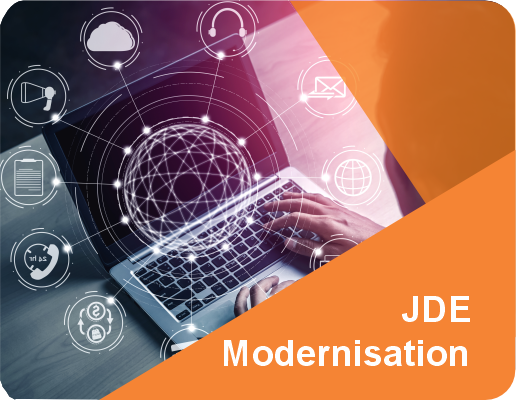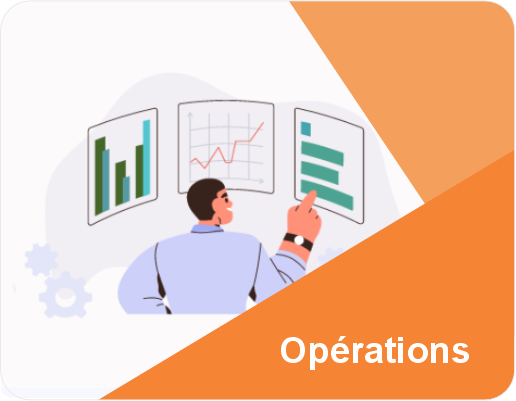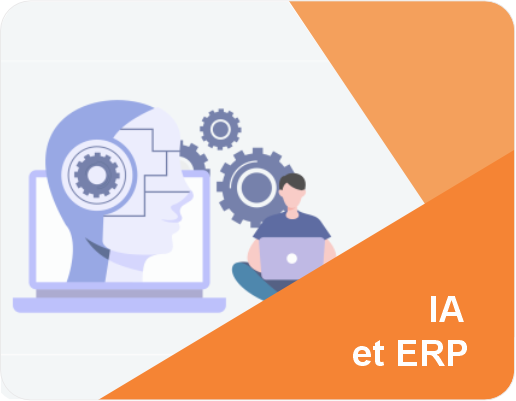Tuesday February 27, 2024, by Camille Berthelot
The implementation of an Enterprise Resource Planning (ERP) is a crucial step for any company looking to modernize its operations and optimize resource management. However, the success of the implementation largely depends on the competence and expertise of the partner responsible for it. To ensure the success of your project and effectively meet your specific needs, it is important to consider the nine fundamental criteria when it comes time to choosing the ideal ERP implementation partner. We have compiled a list of important criteria that our clients consider when choosing Era Consulting Group as their implementation partner.
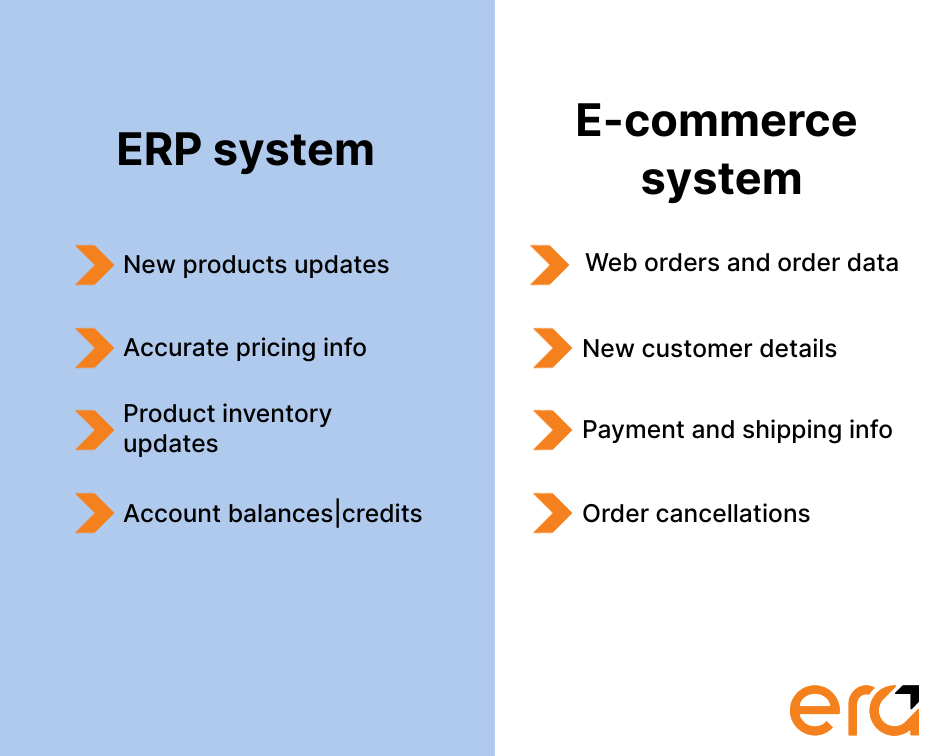
Centralization Data Management
Centralizing customer data is crucial for optimizing operations in e-commerce, with ERP systems playing a pivotal role in aggregating diverse information for a cohesive overview of interactions, purchase patterns, and preferences. This consolidated data empowers businesses to implement targeted marketing strategies and effective customer relationship management. In both B2B and B2C contexts, the centralized repository facilitated by ERP systems ensures uniformity across sales channels, mitigating discrepancies, and enhancing overall customer clarity.
In B2B transactions, centralization involves aggregating corporate client information, procurement history, and business intricacies. ERP systems enable businesses to present a comprehensive overview of interactions, negotiated terms, and purchasing patterns for corporate clients. The uniformity achieved ensures consistent and accurate information, fostering reliability and transparency in the B2B customer experience.
For B2C, centralizing customer data compiles individual consumer information, preferences, and transactional behavior. ERP systems cater to the diverse needs of individual consumers, empowering businesses to implement targeted marketing strategies and personalized product recommendations. Acting as a centralized hub, ERP systems ensure consistent product information across various platforms, fostering a cohesive and reliable shopping experience for individual customers.
Integrated Business Processes
The integration of ERP systems in e-commerce significantly improves order-to-cash processes. In a B2B context, consider a manufacturing company negotiating a bulk order of raw materials with a long-term supplier. The ERP system facilitates the creation of a customized contract, manages negotiated pricing structures, and streamlines the procurement process, ensuring accurate financial transactions and inventory updates.
In contrast, for a B2C scenario, envision an online retail platform during a seasonal sale where individual customers place numerous smaller orders for discounted products. The ERP system handles the high volume of transactions, updates inventory levels in real-time, and ensures that promotions are applied accurately, enhancing the overall customer experience. While B2B transactions focus on intricate negotiations and complex contract management, B2C transactions emphasize efficiently handling numerous smaller orders and dynamic pricing scenarios.
Efficient Inventory Management
The real-time inventory tracking facilitated by ERP systems in e-commerce serves as a critical tool. For B2B transactions, the emphasis is on optimizing stock management across diverse warehouses and sales channels, preventing stockouts, and efficiently streamlining reordering processes for bulk orders.
In the B2C context, the focus shifts to dynamically responding to changing demand patterns, leveraging historical sales data and predictive analytics for precise demand forecasting. This strategic adjustment of inventory levels minimizes unnecessary costs, ensuring products are readily available to individual customers while avoiding the financial burden of excess inventory. Both models benefit from the agility and cost-effectiveness that ERP-driven inventory management provides, albeit with nuanced applications tailored to the specific demands of B2B and B2C transactions.
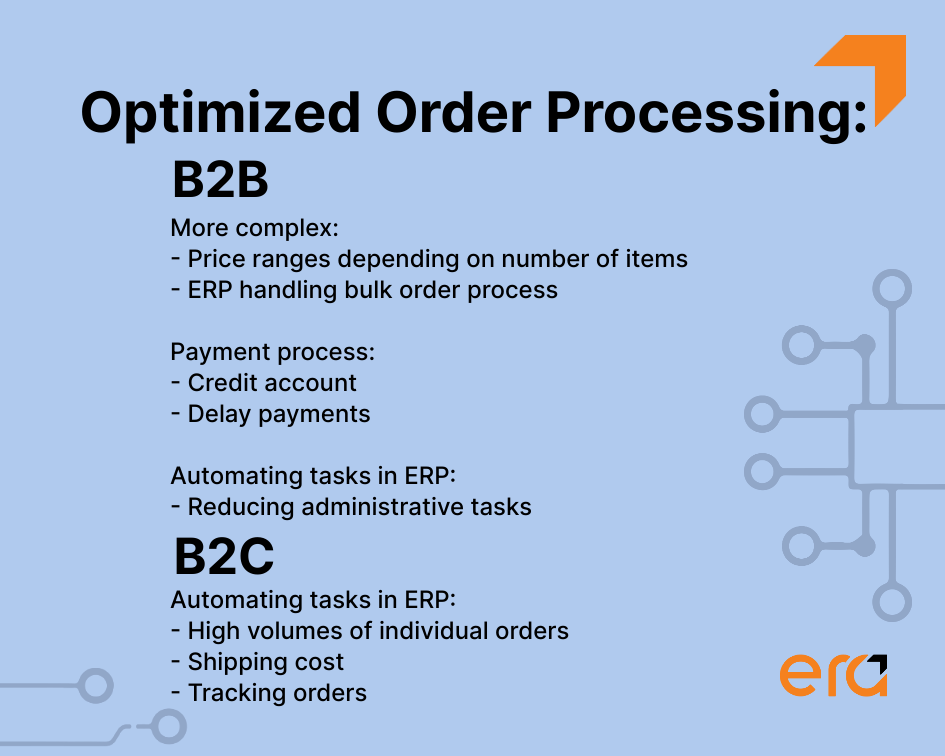
Optimized Order Processing
The automation capabilities of ERP systems in e-commerce highlight distinct applications for B2B and B2C models. In a B2B context, where transactions are often more complex and involve larger order volumes, ERP automation is crucial for efficiently handling bulk order processing, negotiating terms, and managing complex payment and invoicing procedures. The emphasis is on automating tasks that cater to the specific needs of business clients, contributing to smoother interactions and reducing the administrative burden.
In contrast, for B2C transactions, the focus is on automating tasks associated with a high volume of individual orders. ERP systems streamline order entry, payment processing, and invoice generation for individual customers, ensuring a seamless and error-free experience. The automation of shipping-related tasks, such as calculating costs and providing real-time tracking information, is tailored to the frequent and smaller-scale orders characteristic of B2C e-commerce. B2B and B2C benefit from ERP-driven automation in order processing.
Enhanced Customer Experience
The integration of ERP systems with CRM modules unlocks powerful personalization capabilities, allowing businesses to tailor customer interactions extensively. In B2C, this encompasses personalized product recommendations, targeted promotions, and customized communication based on individual preferences. The unified customer data within the ERP system contributes to responsive customer support, as representatives gain a comprehensive view of customer interactions, facilitating quicker issue resolution and enhancing overall customer satisfaction. Through the seamless integration of ERP and e-commerce systems, customers benefit from a user-friendly experience, staying informed throughout the entire sales process.
In B2B, the interface allows updates and access to real-time data, such as current product and shipping information, minimizing potential frustrations, and fostering enduring relationships with customers. For instance, an online retailer leveraging ERP and CRM integration can offer personalized recommendations and efficient issue resolution, ensuring a positive and tailored experience for each customer.
Financial Management and Reporting
The precise financial management capabilities of ERP systems underscore specific differences between B2B and B2C models. In the realm of B2B transactions, where financial intricacies often involve complex negotiations and bulk orders, ERP systems automate tasks like invoicing and billing to streamline financial processes tailored to the needs of business clients. The emphasis is on managing extensive financial data to support compliance, strategic decision-making, and the specific financial requirements of long-term contractual agreements.
Conversely, in B2C, ERP systems focus on managing a high volume of individual transactions with accuracy and efficiency. Automated financial tasks such as invoicing and billing are geared towards the rapid pace of frequent, smaller transactions. Additionally, the support for multi-currency transactions in ERP systems becomes essential for international B2C e-commerce ventures. This feature ensures that online retailers can seamlessly conduct transactions in various currencies, maintaining accurate financial records and complying with international accounting standards. It enables standardized financial reporting that aligns with the complexities of catering to a diverse global customer base. In summary, while both B2B and B2C benefit from ERP-driven financial management, the nuances lie in addressing the specific financial intricacies and global considerations of each model.
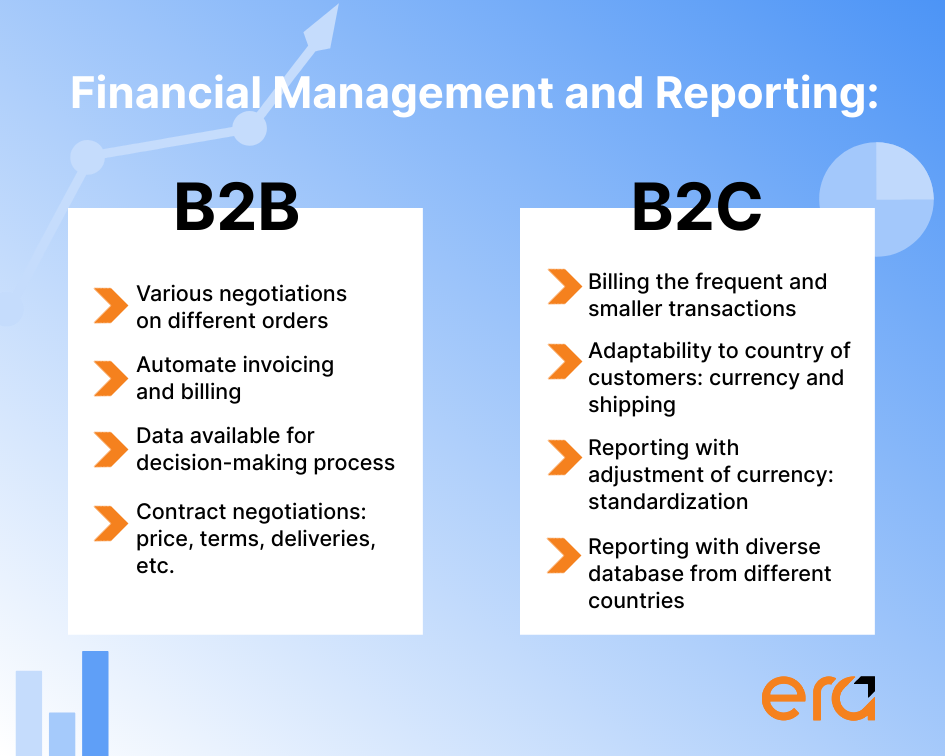
Data Analytics for Informed Decision-Making
The integration of business intelligence tools within ERP systems underscores specific differences in how to leverage data analytics for decision-making. They benefit from data-driven decision-making facilitated by ERP-integrated business intelligence tools; the specific applications align with the distinctive characteristics and priorities.
In B2B, the transactions are often more complex and involve long-term relationships, the integration of business intelligence tools enables businesses to delve into data analysis for strategic insights. The enterprises use these tools to track key performance indicators, analyze trends, and make informed decisions that align with the unique needs of the customers. Customizable dashboards within ERP systems cater to the diverse stakeholders involved in B2B transactions, offering tailored presentations of metrics related to order fulfillment, contract compliance, and client satisfaction.
On the other hand, in B2C, the integration of business intelligence tools focuses on the high volume of individual transactions. Online retailers use these tools to create visually intuitive dashboards that provide real-time analytics on sales, customer behavior, and inventory levels. The emphasis is on adapting quickly to dynamic consumer preferences, enhancing the efficiency of decision-making in a fast-paced retail environment.
Scalability and Flexibility
The adaptability of ERP systems in e-commerce highlights specific distinctions between B2B and B2C models. In the context of B2B transactions, where business needs can be highly specialized and evolving, the modular architecture of ERP systems becomes particularly advantageous. This adaptability allows B2B enterprises to customize their ERP systems by adding or modifying modules to meet the unique demands of different business clients, facilitating a more tailored and efficient approach to order fulfillment, contract management, and other specialized processes.
In B2C, where the emphasis is often on handling a high volume of individual transactions, ERP systems with modular design provide scalability to manage the rapid growth in transaction volumes and a diverse range of products. For example, a B2C e-commerce platform can seamlessly integrate new modules for functionalities like customer relationship management to enhance the customer experience and support personalized marketing initiatives. The focus in B2C is on adapting quickly to changing consumer trends and preferences, and the modular nature of ERP systems supports this agility by enabling the integration of new features as needed.
Regulatory Compliance
The role of ERP systems in addressing tax compliance and data protection underscores specific distinctions in e-commerce. Both B2B and B2C benefit from the tax compliance and data protection features of ERP systems, the specific applications cater to the unique transactional characteristics, complexities, and privacy expectations.
In B2B transactions, where the scale and complexity of transactions are often higher, ERP systems play a crucial role in automating tax calculations for bulk orders, ensuring meticulous adherence to diverse regional and international tax regulations. The emphasis is on managing the intricate financial aspects of transactions, preventing errors, and supporting compliance with complex tax structures that may vary based on the nature of business contracts and negotiations.
ERP systems in B2C automate tax calculations for a high volume of individual transactions, ensuring accuracy and compliance with diverse tax regulations applicable to individual consumers. Moreover, with the growing emphasis on data protection, ERP systems in B2C e-commerce integrate features designed to safeguard customer data, ensuring strict compliance with privacy laws. The focus is on building and maintaining trust with individual consumers by prioritizing the protection of their personal information, aligning with the heightened expectations for privacy in the B2C market.

Supplier and Partner Collaboration
In e-commerce, ERP systems play a vital role in facilitating communication and collaboration, but the nature of these interactions differs between B2B and B2C models. In B2B transactions, characterized by complex negotiations and long-term partnerships, ERP systems enhance communication with suppliers and partners by enabling real-time sharing of critical information, optimizing supply chains, and coordinating promotional activities for mutual benefit. This strengthens collaborative efforts beyond individual transactions.
In contrast, in the fast-paced B2C, ERP systems streamline communication with suppliers to efficiently manage high volumes of individual transactions, ensuring timely and reliable product availability for a diverse customer base. While both benefit from efficient communication, the nuanced applications cater to the collaborative nature of B2B partnerships and the customer-centric focus of B2C transactions.
Continuous Improvement and Adaptability
E-commerce businesses deploy ERP systems to establish invaluable feedback loops, gathering data on customer satisfaction and operational efficiency. The approach to feedback utilization, however, differs between B2B and B2C models.
In B2B transactions, where relationships are often long-term and personalized, ERP systems play a pivotal role in gathering detailed insights on customer satisfaction, order accuracy, and fulfillment speed, fostering continuous improvement efforts tailored to business clients' specific needs.
In the high-volume and dynamic B2C, ERP systems with feedback loop functionalities enable businesses to swiftly gather insights on individual customer experiences, driving rapid adjustments in processes and services to meet the diverse and evolving demands of consumers. Additionally, the incorporation of agile development methodologies within ERP systems allows for prompt responses to market changes, ensuring adaptability and agility in the ever-shifting e-commerce environment for both B2B and B2C models.
In conclusion, the comprehensive integration of ERP systems to an e-commerce B2B and B2C business proves to be a cornerstone for success, offering a multitude of benefits for both. The centralized data management capabilities ensure a cohesive overview of interactions, purchase patterns, and preferences, fostering targeted marketing strategies and effective customer relationship management in both transactional contexts. The integrated business processes, efficient inventory management, and optimized order processing facilitated by ERP systems cater to the specific complexities of B2B transactions, characterized by intricate negotiations, while also addressing the high volume and rapid pace of B2C transactions. The enhanced customer experience, driven by the integration of ERP systems with CRM modules, underscores the personalized approach tailored to the unique needs of each model. Furthermore, ERP systems contribute to precise financial management, leverage data analytics for informed decision-making, offer scalability and flexibility, and address regulatory compliance, tailoring their applications to the nuanced requirements of B2B and B2C e-commerce.
At Era Consulting Group, our expertise lies in harnessing the full potential of ERP systems to elevate your business operations, ensuring adaptability, efficiency, and sustained growth in dynamic e-commerce. For an integrated e-commerce solution connected to your ERP solution, please contact our team for further information.


